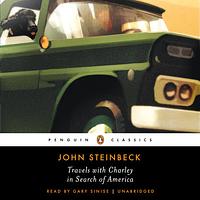Take a photo of a barcode or cover
I loved this book on so many levels. As a dog owner who adores her pup more than anything in the world, I loved Steinbeck's interactions with Charley, particularly the personification and invented conversations. Reading this made me want to hop in the car with my dog and take off to see the country.
This book also taught me something that reading Steinbeck's fiction hasn't: Steinbeck is a funny guy. The humor was perfectly observed. But what strikes me most about this book is how so much of what he penned in 1962 rings true today. All of his cautions, predictions, and observations about America and Americans have come true.
This book also taught me something that reading Steinbeck's fiction hasn't: Steinbeck is a funny guy. The humor was perfectly observed. But what strikes me most about this book is how so much of what he penned in 1962 rings true today. All of his cautions, predictions, and observations about America and Americans have come true.
challenging
hopeful
inspiring
reflective
relaxing
slow-paced
If you like your boredom with sides of racism and dashes of misogyny, have at it. Yes, the book was written in the early 1960s, but, as a reader in the 2020s, I do not enjoy reading slurs for Mexican people or comparisons of Black people to pet dogs.
adventurous
funny
hopeful
inspiring
reflective
medium-paced
An amazingly thoughtful book and a non-fiction that reads like fiction, loved it from beginning to end and the last couple of chapters were especially well-written and profound.
adventurous
informative
reflective
medium-paced
Sucker for road trip writing? How about dogs as a main character? Yes to both? Then this book is for you!
adventurous
emotional
inspiring
reflective
medium-paced
Still relevant and thought provoking
"A journey is a person itself; no two are alike"
Right off the bat, I knew I would like the tale of Steinbeck's journey across America.
The old owner wrote: "We see things as we are, not as they are."
Truth. Beauty. Steinbeck.
Steinbeck drove across the country [starting in the north-east] because he "needed to discover all of America." He got himself a travel truck and named it Rocinante after Don Quixote's horse, which implies Steinbeck likens himself to Quixote. He is to travel alone with only the company of his poodle, Charley. He even left his wife at home, with only a mild break, from both his travels and his loneliness, in Chicago when the wife flew out.
Steinbeck had some really interesting insights in America. He writes: "Yellow Stone National Park is no more representative of America than is Disneyland." I can't say that I agree with Steinbeck's assessment that they are not representative of America, because I think that they both are representative of America and it's people, especially of tourism and travel, but also the things we as Americans like.
Steinbeck also feels that American's have no roots. This is because we are descended from people without roots. The very people who founded America left because they didn't have roots, and so we are a rootless people. Those with roots stayed where they were. I'm not sure how I feel about this assessment, though he makes a good argument for his position.
On his way back home, Steinbeck first travels through the South. Now, remember, this was 1960, so he encountered some unique perspectives on race, from both directions. In order to see these perspectives, he never revealed what exactly he thought.
The end of his journey kind of fizzled out, and the book definitely reflected this of Steinbeck. It was just like he ran out of gas. He was tired. He was ready to go home. There was no real conclusion. It was just a journal of his experiences and loose interviews as he journeyed across this "New America" which did not live up to his expectations. This may be, at least in part, because of Steinbeck's age and heart condition. Thom Steinbeck, John's son, gives that as the reason for the trip in the first place. John wanted to see his country one last time, and Thom was a little surprised that the wife let John go on the trip alone because of his condition. Thom says he could have died at any time. This heart condition would have definitely come into play in Steinbeck's growing tired and wanting to come home.
Now, many folks find Travels with Charley to be a work of fiction, and maybe it is. Or maybe, in my opinion, Steinbeck is recounting his experiences, his truth. Maybe it didn't happen exactly as he said it did. Maybe he was an old man waxing sentimental about the country he loves. But we must take all memoirs or personal tales with a grain of salt! And this was a fairly enjoyable one, with just a titch of dry parts. So, you know, a regular memoir. I jest. But I do recommend this book if you love memoirs, Steinbeck, or America.
Read on, my friends.
http://myabsolutelyridiculouslife.blogspot.com/search/label/Books
Right off the bat, I knew I would like the tale of Steinbeck's journey across America.
The old owner wrote: "We see things as we are, not as they are."
Truth. Beauty. Steinbeck.
Steinbeck drove across the country [starting in the north-east] because he "needed to discover all of America." He got himself a travel truck and named it Rocinante after Don Quixote's horse, which implies Steinbeck likens himself to Quixote. He is to travel alone with only the company of his poodle, Charley. He even left his wife at home, with only a mild break, from both his travels and his loneliness, in Chicago when the wife flew out.
Steinbeck had some really interesting insights in America. He writes: "Yellow Stone National Park is no more representative of America than is Disneyland." I can't say that I agree with Steinbeck's assessment that they are not representative of America, because I think that they both are representative of America and it's people, especially of tourism and travel, but also the things we as Americans like.
Steinbeck also feels that American's have no roots. This is because we are descended from people without roots. The very people who founded America left because they didn't have roots, and so we are a rootless people. Those with roots stayed where they were. I'm not sure how I feel about this assessment, though he makes a good argument for his position.
On his way back home, Steinbeck first travels through the South. Now, remember, this was 1960, so he encountered some unique perspectives on race, from both directions. In order to see these perspectives, he never revealed what exactly he thought.
The end of his journey kind of fizzled out, and the book definitely reflected this of Steinbeck. It was just like he ran out of gas. He was tired. He was ready to go home. There was no real conclusion. It was just a journal of his experiences and loose interviews as he journeyed across this "New America" which did not live up to his expectations. This may be, at least in part, because of Steinbeck's age and heart condition. Thom Steinbeck, John's son, gives that as the reason for the trip in the first place. John wanted to see his country one last time, and Thom was a little surprised that the wife let John go on the trip alone because of his condition. Thom says he could have died at any time. This heart condition would have definitely come into play in Steinbeck's growing tired and wanting to come home.
Now, many folks find Travels with Charley to be a work of fiction, and maybe it is. Or maybe, in my opinion, Steinbeck is recounting his experiences, his truth. Maybe it didn't happen exactly as he said it did. Maybe he was an old man waxing sentimental about the country he loves. But we must take all memoirs or personal tales with a grain of salt! And this was a fairly enjoyable one, with just a titch of dry parts. So, you know, a regular memoir. I jest. But I do recommend this book if you love memoirs, Steinbeck, or America.
Read on, my friends.
http://myabsolutelyridiculouslife.blogspot.com/search/label/Books
adventurous
funny
informative
inspiring
reflective
medium-paced
focused on new england and glanced over the rest of the country comparatively quickly - at least considering the size of the country.




